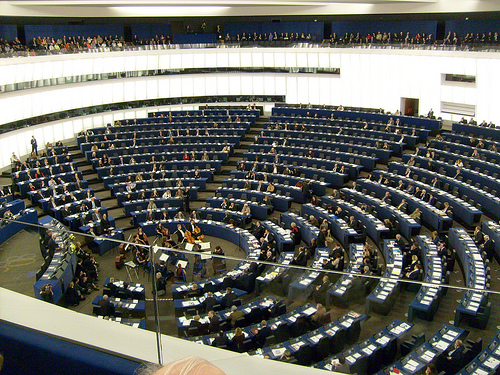Council of Europe Cybercrime Convention: Forces acting for change at the conference, esp. from the Estonian front

The fight against cybercrime is receiving well-deserved attention this week. Countries around the world congregate at Strasbourg on Tuesday to discuss what can be done at government-level to control online crime. Yet, countries bring to the forum widely different perceptions; perceptions differing not only as to the primary challenges facing the online world but also as to the initiatives that need to be taken in order to deal with them. A Mix of Concerns promise to be jostling for attention, asking to be resolved, at the convention.
The Dilemma of The Individual versus The Community
The age old tussle between the Individual and the State should mark its presence heavily at the convention. The convention can be divided into two groups. One group gives more priority to the fight against terror online. It addresses the challenge of terrorism facing the world and urges on the need to put this fight ahead of everything else at the forum.
The other puts its weight behind an issue affecting individuals or group of individuals at the most: internet crime and fraud. It trains our eyes to a problem that is looming and threatening to get out of hand at this very moment. This group would rather put the interest of man ahead of his state.
There is a tussle that is going on even within this group. One side is crying out for more legislation to bolster the fight against crime, striving for stricter control and better policing through tougher laws. The other side fights against this idea saying it preys on individual freedom and on rights given to people in their constitution.
The Estonian Challenge
One group that would be hard to ignore would be Estonians. Stirred from personal experience, it would be pressing hard for reforms in the way cybercrime is fought worldwide. It will be armed with the strong motivation of protecting Estonia from situations akin to what happened last year.
The crisis started off with the ethnic minority community of Russians in the country objecting to relocation of a monument from the Soviet era within Tallinn, the country’s capital, to a place outside the city. Their tirade snowballed into a huge movement that left the country wringing under the grip of a cyber onslaught.
Bombarded with huge amount of traffic, quantities it was ill-equipped to handle, Estonia took the hard decision of closing doors temporarily to incoming traffic from outside the country.
The ramifications of the move was so great that it affected the country’s economy which is heavily dependent on the internet. Estonia initially accused Russia with backing up the onslaught but later withdrew charges realizing it lacked the evidence to prove it.
It is now pitching for standardization of international laws in fighting cybercrime. This would make it easy to solve crimes committed across national boundaries. It is pushing, next, for a system to be put in place that would ensure smooth liaisoning amongst international agencies involved in global investigations.
The call to global standardization of cyber laws could not be more relevant than to this year’s convention. Since 2001, when the convention came into being, only 43 countries have signed in to the treaty and about half have changed legislation within their countries to put it into force.
Such a move would make cyberspace better for everybody.
Source: AP Photo by: Inyucho
Related posts:
- Council of Europe Cyber Crime Convention: Guidelines for Formal Cooperation between Law Enforcers and ISP’s on the anvil
- Infosecurity Conference: Interesting sidelights of the event
- Growing Trends of Fraud and Scams Year after Year
- Online Banking fraud targets 20,000 bank accounts in UK ,Six Arrested
- ATM Scam Alert ! Beware of 2010 Atm Restoration Compensation Payment Reminder
